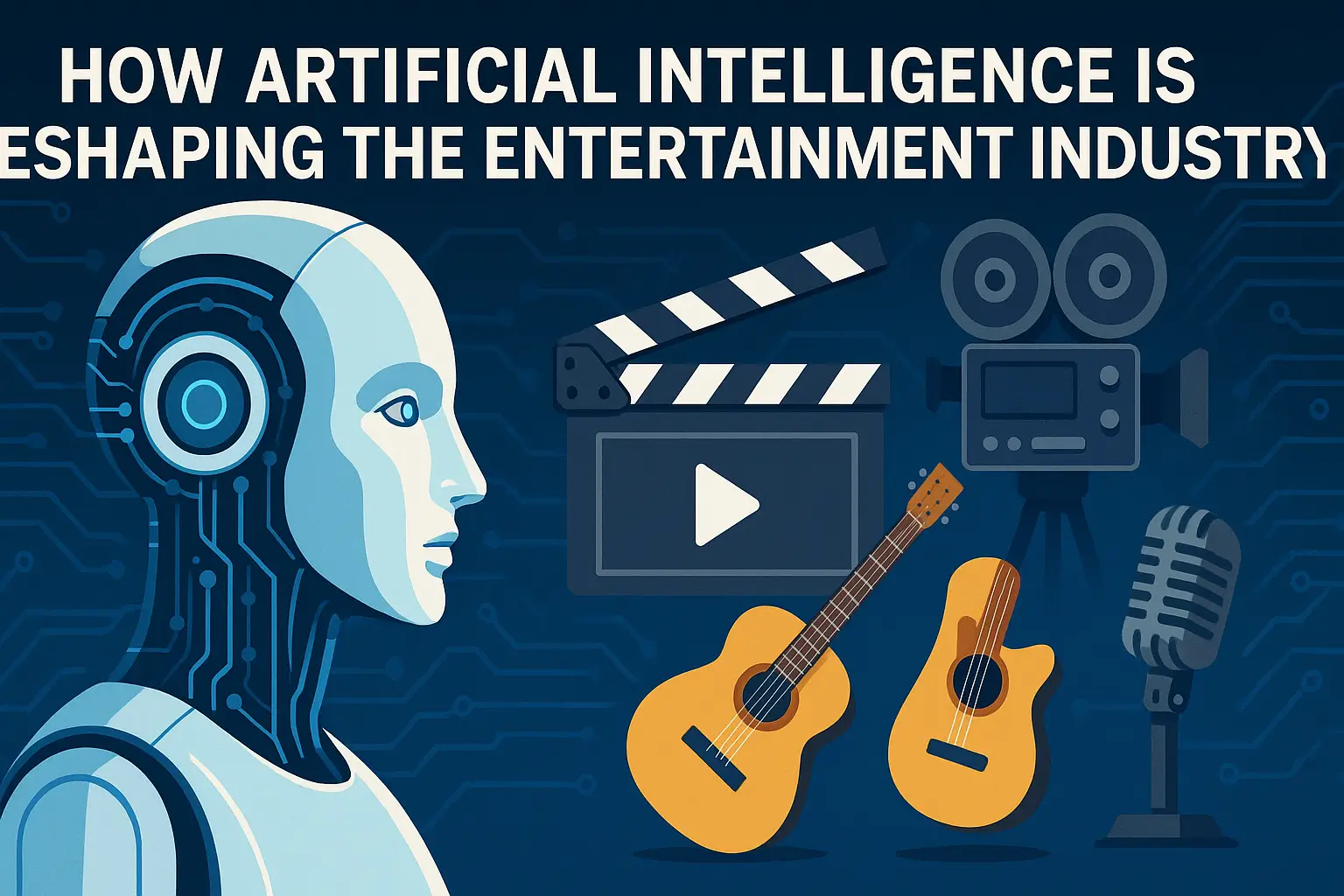Artificial Intelligence (AI) is not just behind the scenes anymore—it’s becoming a key player in how we create, distribute, and enjoy entertainment. From personalized streaming recommendations to AI-generated scripts and music, this technology is redefining storytelling and the audience experience across film, music, video games, and more.
Let’s dive into the ways AI is reshaping the entertainment landscape and what the future might hold for creators and consumers alike.
AI in Content Recommendation and Personalization
Streaming giants like Netflix, Spotify, and YouTube owe much of their success to AI-powered recommendation engines. These systems:
- Analyze viewing/listening habits
- Consider time of day, device, and location
- Predict content preferences
- Curate playlists, watchlists, and homepages
By understanding user behavior, AI boosts engagement and keeps audiences hooked with hyper-relevant content.
AI in Scriptwriting and Story Generation
AI tools like ChatGPT and Sudowrite are being used to assist with:
- Brainstorming plot ideas
- Writing dialogue or scenes
- Rewriting or translating scripts
- Testing multiple endings or variations
While AI isn’t replacing screenwriters, it serves as a creative partner that enhances productivity and experimentation in storytelling.
AI-Generated Music and Sound Design
Musicians and producers use AI tools like AIVA, Amper Music, and Jukedeck to:
- Compose original music in various styles
- Generate background scores for videos or games
- Mimic the sound of specific artists or genres
- Assist with mixing and mastering
AI democratizes music production, enabling creators without formal training to bring their ideas to life.
AI in Animation and Visual Effects (VFX)
Animation and film studios are leveraging AI to streamline production by:
- Automating character animation and lip-syncing
- Enhancing image resolution and de-aging effects
- Reconstructing scenes using minimal footage
- Detecting visual inconsistencies or continuity errors
These applications reduce costs and speed up timelines without compromising artistic quality.
Virtual Influencers and AI-Generated Celebrities
AI has given rise to virtual personalities like:
- Lil Miquela, a digital fashion influencer
- FN Meka, a virtual rapper
- Shudu, a photorealistic digital supermodel
These AI characters gain real-world followers and brand deals, blurring the line between fiction and reality.
AI in Gaming: Smarter Worlds and Dynamic Storytelling
In video games, AI enables:
- Non-player characters (NPCs) with realistic behaviors
- Procedural content generation for infinite environments
- Personalized difficulty levels and adaptive narratives
- AI-powered game testing and bug detection
Games become more immersive and replayable, providing unique experiences for every player.
Deepfake Technology in Entertainment
While controversial, deepfakes are also being used creatively:
- De-aging actors in films and TV shows
- Bringing historical figures to life in documentaries
- Replacing stunt doubles or reconstructing lost footage
However, ethical use and consent are critical to prevent misuse.
AI in Film Editing and Production Workflow
AI tools help editors and producers by:
- Organizing footage automatically
- Suggesting cuts and transitions
- Syncing audio and video
- Flagging continuity or pacing issues
This enhances creative focus and reduces the burden of repetitive tasks.
Personalized Marketing and Trailers
AI is used to:
- Create personalized trailers based on user data
- Predict audience reactions to film or music releases
- Optimize ad placements and campaign timing
- Generate buzz through sentiment analysis and trend tracking
Studios can better target their promotions and maximize engagement.
AI in Live Performances and Virtual Events
Performers are integrating AI into their shows through:
- Real-time visual effects triggered by music or movement
- AI-generated stage visuals and lighting control
- Virtual concerts with interactive, AI-powered environments
- Digital avatars representing artists in the metaverse
These innovations open new creative dimensions and global access to entertainment.
Benefits of AI in Entertainment
1. Enhanced Creativity
AI supports artists in exploring new ideas, formats, and techniques.
2. Efficiency and Cost Reduction
Automation reduces production time and resources, making content creation more accessible.
3. Personalization
Audiences enjoy more relevant and engaging content, tailored to their tastes.
4. Innovation
New formats like interactive films and AI-generated music emerge, expanding artistic possibilities.
5. Inclusivity
AI tools lower barriers for independent creators and diverse voices to enter the industry.
Challenges and Ethical Considerations
1. Copyright and Ownership
Who owns AI-generated content? Laws and norms are still catching up.
2. Deepfake Risks
Misuse of AI for impersonation, fake news, or unauthorized likenesses remains a serious concern.
3. Bias and Representation
AI trained on biased data can reinforce stereotypes or exclude underrepresented groups.
4. Job Displacement
Some fear that automation may reduce demand for human editors, composers, or actors.
5. Authenticity
Over-reliance on AI may lead to formulaic or emotionally hollow content if not balanced with human input.
Future Trends in AI and Entertainment
The future promises even deeper integration of AI in entertainment, including:
- Fully AI-generated films, music albums, or video games
- Virtual reality experiences enhanced by AI interaction
- AI-curated playlists and channels tuned to user mood
- Personalized story arcs in interactive films
- Collaborative performances between humans and AI avatars
As tools become more sophisticated, the line between creator and technology will continue to evolve.
Final Thoughts: Entertainment Reimagined
Artificial Intelligence is not replacing creativity—it’s amplifying it. By combining machine learning with human imagination, we unlock new forms of expression, storytelling, and connection.
As the entertainment industry continues to innovate, the collaboration between artists and algorithms will shape experiences that are richer, more personalized, and more immersive than ever before.
